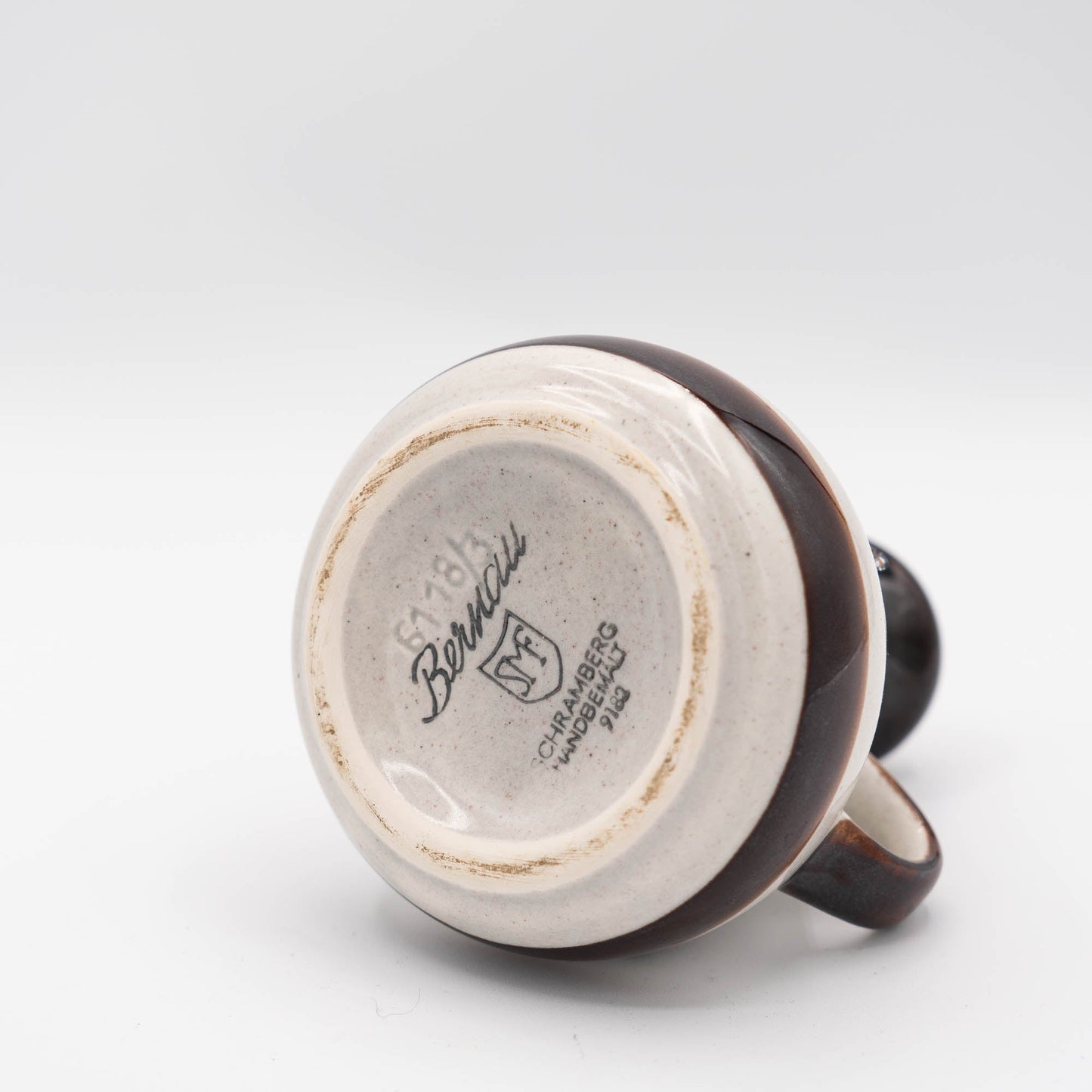Schramberg
Vintage "Bernau" Pitcher- Schramberg - c1960s
Vintage "Bernau" Pitcher- Schramberg - c1960s
Couldn't load pickup availability
Step back into the vibrant 1960s with this Schramberg "Bernau" small pitcher, a beautifully crafted piece made from ironstone with a gorgeous, majolica-like glaze.
The "Bernau" pattern is renowned for its bold, vivid colours and slightly raised design, creating a texture that’s as lovely to feel as it is to look at.
Highly sought-after in today’s market, this mid-century pitcher is perfect for those who appreciate both vintage aesthetics and practical functionality. Whether you’re serving your favourite beverages or simply displaying it as part of your collection, the "Bernau" pitcher brings timeless charm to your home.
The Schramberg Majolica Factory ("Schramberger Majolikafabrik") was founded in 1820 in the Black Forest region of Germany. Known for its high-quality ceramics and majolica, Schramberg was especially influential during the Art Nouveau and Art Deco periods, producing pieces that were both functional and decorative.
The "Bernau" pattern is a fine example of Schramberg's ability to blend floral motifs with geometrical designs, creating timeless and collectible ceramics.
- Material: Earthenware
- Pattern: Bernau
- Style: Art Naïve / "Bauernmalerei"
- Technique: Hand-painted
- Place of Origin: Germany / Baden-Würtemberg
- Mark: SMF Schramberg, Bernau, Handbemalt, 9182
- Date of Manufacture: 1960s
- Condition: Mint
Share
- Worldwide Shipping
- Secure Packaging
- Loving Curation









Origin & Maker
Schramberg Majolika, founded in 1820 in the town of Schramberg in Germany’s Black Forest region, quickly established itself as one of the leading manufacturers of pottery and earthenware. Known for its high-quality craftsmanship and innovative designs, the company produced a wide range of items, from functional kitchenware to decorative ceramics. Schramberg was especially famous for its Majolica pottery, characterized by its rich, colorful glazes, intricate designs, and distinctive textures. Throughout its history, the company collaborated with renowned artists and designers, contributing to its reputation for cutting-edge and stylish pieces.
In the mid-20th century, Schramberg's designs took on a distinctly modernist flair, with patterns such as Bernau gaining widespread popularity. Introduced in the 1960s, the Bernau pattern is a vivid example of mid-century design, featuring bold, raised floral motifs in striking colors. This pattern, with its tactile appeal and durable ironstone base, became an instant hit and remains highly sought after by collectors today. The combination of a glossy, majolica-like glaze and the raised texture of the Bernau pattern made it both visually stunning and a joy to handle, securing Schramberg's place in the hearts of pottery lovers.
Blog posts
View all-

A Serendipitous Morning at the Rue de Bretagne ...
There are few joys in life that match the thrill of stumbling upon a hidden treasure, and for me, flea markets hold that magical allure. One of my favourite flea...
A Serendipitous Morning at the Rue de Bretagne ...
There are few joys in life that match the thrill of stumbling upon a hidden treasure, and for me, flea markets hold that magical allure. One of my favourite flea...
-

Emile Bourgeois and "Le Grand Dépôt" in Paris
Recently, I found this stunning Sarreguemines wash set. It was at the Brocante in Belfort, France. On this day, we had got up at 4 AM to be there in...
Emile Bourgeois and "Le Grand Dépôt" in Paris
Recently, I found this stunning Sarreguemines wash set. It was at the Brocante in Belfort, France. On this day, we had got up at 4 AM to be there in...
-

The Legacy of Robert Haviland: A Journey from N...
The story of Robert Haviland porcelain is one of artistry, transatlantic ambition, and enduring heritage. It begins in the mid-19th century when David Haviland, an enterprising New Yorker, founded Haviland...
The Legacy of Robert Haviland: A Journey from N...
The story of Robert Haviland porcelain is one of artistry, transatlantic ambition, and enduring heritage. It begins in the mid-19th century when David Haviland, an enterprising New Yorker, founded Haviland...












